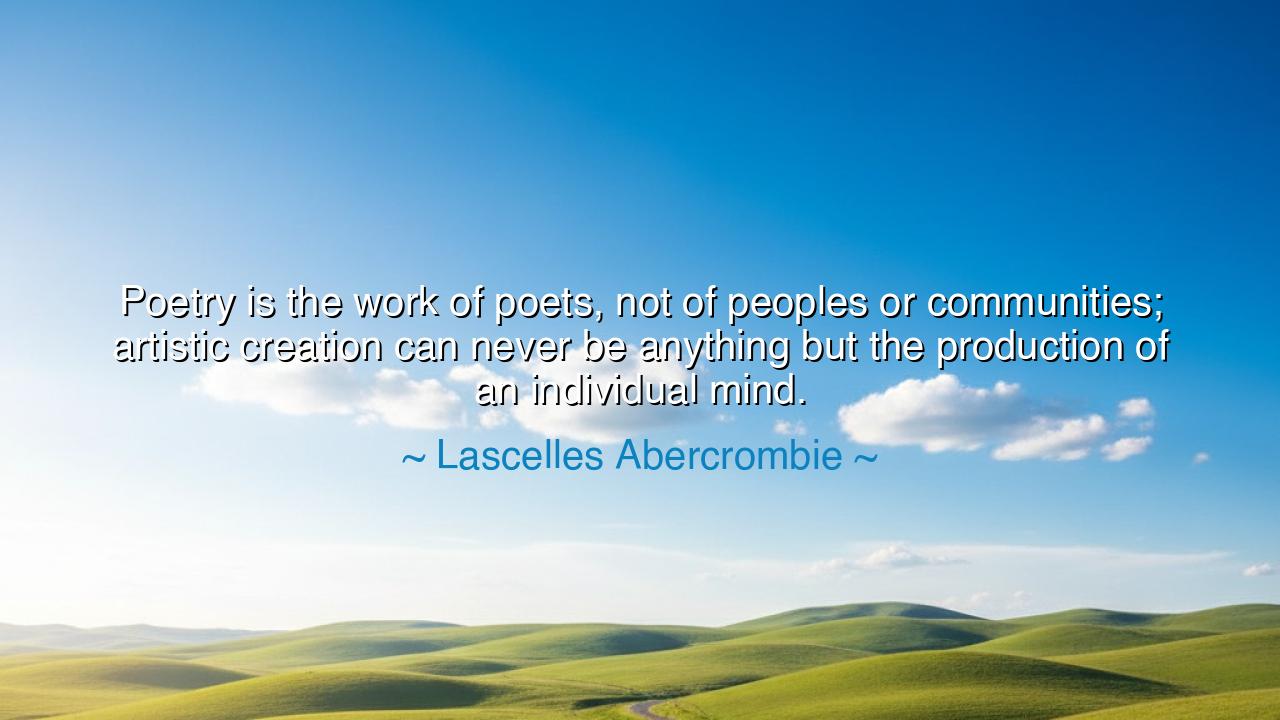
Poetry is the work of poets, not of peoples or communities;
Poetry is the work of poets, not of peoples or communities; artistic creation can never be anything but the production of an individual mind.






“Poetry is the work of poets, not of peoples or communities; artistic creation can never be anything but the production of an individual mind.” Thus declared Lascelles Abercrombie, poet and critic, whose words remind us that though poetry may speak to nations, it is always born in the solitude of a single heart. He points to a truth that is at once humbling and exalting: that art, however universal its impact, begins with the vision, struggle, and voice of one person.
The meaning of this saying lies in the tension between the collective and the individual. Nations may celebrate poets, communities may recite and preserve their verses, but the act of creation belongs to one alone. Poetry is not assembled by committees or built by crowds. It is forged in the fire of one person’s thought, emotion, and imagination. Just as no one can dream for another, no one can write a true poem except by the labor of their own inner vision.
The origin of Abercrombie’s insight can be traced to the early twentieth century, when he and others of the “Georgian poets” sought to preserve the dignity of individual artistry in an age increasingly dominated by collectivism and mass culture. He recognized that while songs may become folk traditions and stories may belong to entire peoples, the act of artistic creation itself—bringing something from nothing, shaping it with intention—belongs solely to the individual mind. The community may be its soil, but the poet is the root and seed.
History gives us clear examples. Consider Homer, whose epics became the foundation of Greek identity. Though they were later sung by countless rhapsodes and embraced as the heritage of a people, they began with the vision of one poet, whose mind gave shape to gods, heroes, and battles. Or think of Dante, whose Divine Comedy became Italy’s spiritual map. Though the entire nation embraced it, it was Dante alone who walked the imagined journey, crafting the lines with his solitary genius. These remind us that the greatness of a people often rests upon the shoulders of one individual’s voice.
The lesson here is that while we may long to dissolve ourselves in the collective, we must not forget the responsibility of our individuality. Communities are nourished by poets, but poets are not created by communities—they are created by the fire within themselves. Each of us, though not all may be poets, carries this same truth: the creative spark, the act of bringing something new into the world, cannot be outsourced. It must be carried, shaped, and expressed by each individual mind.
Practically, this means we must cultivate solitude and listen to our own voices. Do not wait for the crowd to hand you vision; seek it within yourself. If you feel called to create, do not wait for permission from society, for no committee can birth your art. Write your poem, paint your canvas, compose your song—not as the voice of a people, but as your own voice. If it is true, the people will find themselves within it. But the work must begin with you.
Thus the teaching endures: poetry may be sung by peoples, cherished by communities, even enshrined by nations—but it is born of the poet, of the solitary labor of one mind daring to create. Lascelles Abercrombie calls us to honor this truth, and to live it. For each of us, in whatever craft we pursue, holds within us the sacred responsibility of creation—not the work of crowds, but the work of a single, striving soul.






DNPham Hoang Dong Nghi
I find Abercrombie’s statement intriguing, but I’m not sure I fully agree. While it’s clear that poetry is often shaped by the poet’s unique perspective, isn’t it also shaped by the larger societal and cultural context? Could it be that the individual mind is influenced by the community, even if it is not the direct source of the creation? I wonder how much the poet’s environment and collective experiences impact their work, even if subtly.
THDo Thi Huyen
Abercrombie’s assertion that artistic creation is only the product of the individual mind seems to ignore the influence that others or society can have on a poet. Is poetry really so isolated from the collective human experience? I believe that while poetry may come from one mind, it often speaks to the shared feelings, struggles, and aspirations of many people. How do we reconcile this individual creation with the collective impact of poetry?
QHVo Quy Hien
I understand Abercrombie’s emphasis on the individual mind behind poetry, but I also question whether this excludes the influence of culture or history on a poet’s work. Can a poem truly be a product of one mind, or is it always shaped by the environment in which the poet exists? I think about how even personal poetry often resonates with universal themes, making it seem as though the community or the world plays a role in its creation.
TTXuan Tong Thi
Abercrombie’s view that poetry is solely the work of an individual mind makes me think about the role of personal experience in artistic creation. Is poetry truly the product of one person’s imagination, or can it be shaped by the collective experiences of a community or culture? I wonder if this perspective limits the idea of poetry as a shared or communal experience, as it often reflects collective themes even when written by an individual.